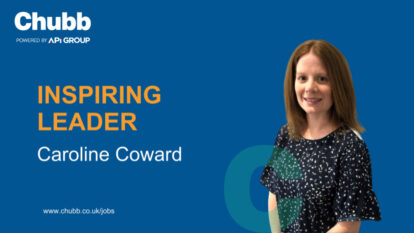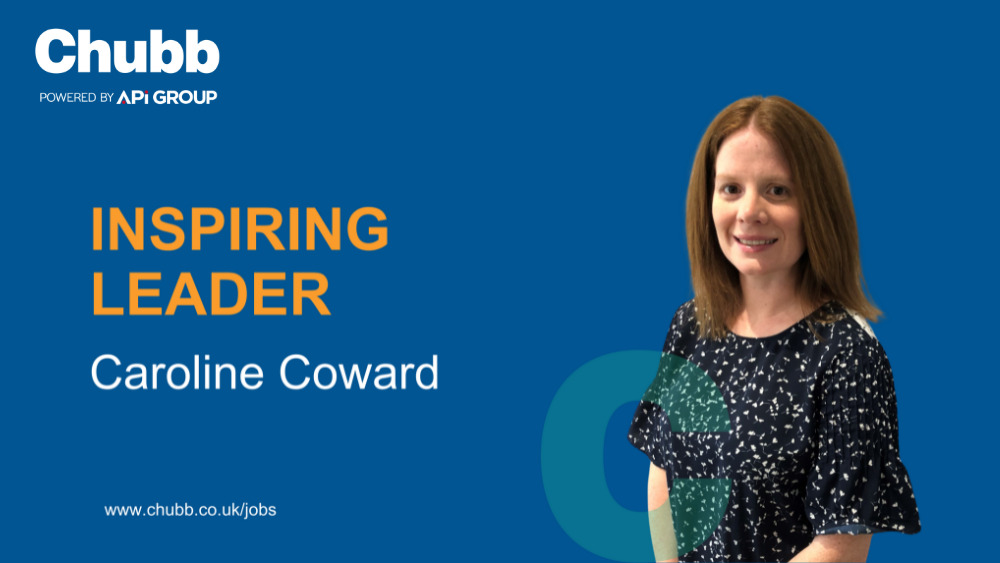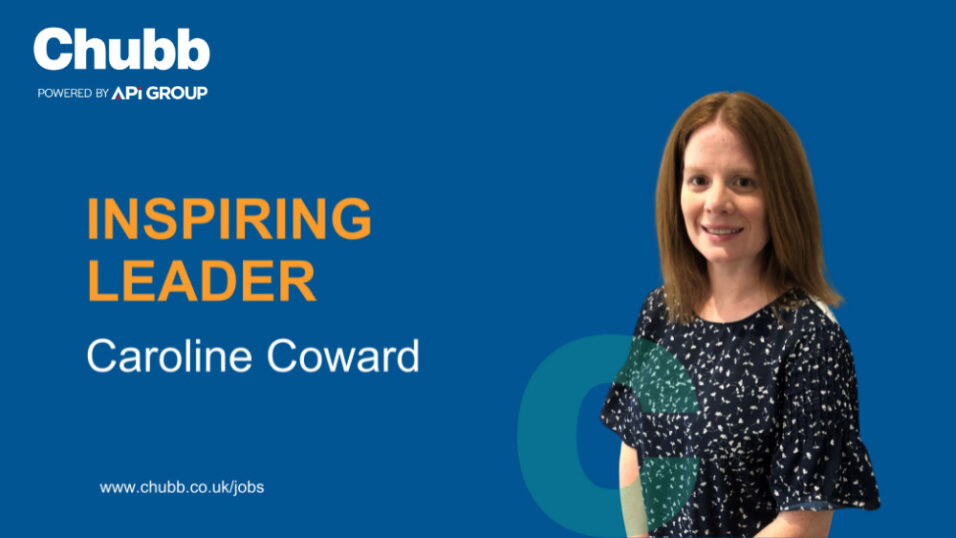



Everybody is ‘Chubb’ – we can all change things
By | 11th January 2024
In our latest Inspiring Leaders piece, we spoke to Caroline Coward, Finance Director at Chubb Fire & Security UK and Ireland.
Caroline started her career with Chubb 13 years ago, after completing a graduate programme with the accounting firm Grant Thornton after university. Caroline believes in grabbing opportunities when they present themselves – and encourages her team to do the same.
From humble beginnings
I was born and bred in Lancashire. My dad passed away when I was eight, so it was just me, my mum and my sister. We had quite a wholesome upbringing. My grandparents had a farm and we used to spend a lot of time on the farm, playing, riding our bikes; on Saturday nights we all used to eat pizza in the lounge and watch Saturday night TV.
At school I was always quite academic, although I was terrible at sport. My mum always used to say the only sporting race I ever won was the egg and spoon race – I didn’t have any sporting capabilities at all.
Growing up I spent a lot of time being a Rainbow, Brownie, then a Guide – I did quite a lot of volunteering, and completed my Duke of Edinburgh awards.
Friends were very important, I used to spend a lot of time with friends, talking on the phone, going to the cinema. That was my childhood.
I fell into finance by chance
I didn’t originally want to go into finance. I always wanted to be a doctor – I actually did biology, chemistry, physics and psychology A levels. During my sixth form I had a sudden change of heart and decided I didn’t want to go to university for five years to train to be a doctor.
At the time I just started doing my psychology A level and really enjoyed it, so I went to Durham University and did a degree in psychology, rather than finance or accounting.
In my third year of university our degrees were coming to an end, and we were starting to think ‘what next?’ My housemate had done an internship as part of her economics degree and was talking about being offered a job where you got to study for a further three years and they paid you. I thought ‘this sounds good!’.
I applied to a number of graduate programs and Grant Thornton was one of them. They invited me in for an interview and offered me a role. And that was that. I almost fell into it by chance. When you are a student you just want a job. I wanted to carry on studying but I wanted to start earning money. So that’s how I became an accountant.
That was the biggest change in the path and why I’m sat in the chair I am now – just that little conversation with my housemate.
After Grant Thornton and completing the graduate programme where they put you through all your professional exams, I got a job at Chubb doing the statutory accounts and the tax. I started at the time the fire and security sides of the business came together, and I have also been part of the journey where we brought the UK and Ireland parts of the business together.
I didn’t think I stood a chance, but I got the job
My former boss persuaded me to get involved in month-ends, so I started looking after management accounts as well as doing the stats and the tax.
He encouraged me to apply for the role of financial controller, even though I did not think I stood a chance as there were at least two other people I thought were more qualified. But I did apply and got the role. I was the financial controller for four years, then I did a job switch.
I started looking after the financial planning and analysis (FP&A) team and the reporting team, and after a while led the finance managers. Then a year ago, when Craig Forbes was appointed Chief Financial Officer for Europe, I stepped up taking more responsibility for the actuals and the FP&A for fire and security.
I have almost had a new job every two to three years that I have been at Chubb.
Currently, I lead a team of 22. We look after all the accounting, forecasting, and finance management. A key risk at the moment has been pricing and inflation. Over the past two years I’ve spent a huge amount of time on pricing, making sure we stay ahead of inflation and our margins aren’t impacted.
A key part of the role is ensuring the P&L owners understand their numbers which helps them drive the business in the right direction. I enjoy spending time talking with the business owners, reviewing the P&Ls and actioning change.
The challenges have kept me at Chubb
The Sarbanes-Oxley Act (a US federal law that mandates certain practices in financial record keeping and reporting for corporations) has been a huge challenge for the finance team. This year we have been embedding the APi control requirements, next year we need to look at how we can sustain the new requirements and take the pressure away from the team. There have always been new challenges, one of the reasons why I have stayed at Chubb so long.
You have to make time to listen to your team
Good leadership is about great communication, being very clear with people about what your expectations are, and also listening – trying to take time to listen to them. I’m very good at talking, so I make sure I take time in conversations to sit back and listen to the team’s ideas. Developing people is also important. We have had great successes in my team. Most of my team have held at least one or two different roles within finance and most of them are progressing. Two of my finance managers started their life in billing. It’s important to find out what skills and talents your team have and gently encourage them to develop themselves. I’ve been fortunate in my career as someone has coached or mentored me into that next step, so I’m always looking for the next step for my team.
Will Costigan and Craig Forbes, played a major role in my career as mentors. In those early days I was enjoying what I was doing, but Will encouraged me to broaden my skill set. I think people do not push themselves forward because they see other people and think they are more suited to the role. I was quite convinced that two other people would get the financial controller role, but Will persuaded me that I did have the right skills and the right attributes to do the role even though I didn’t necessarily have the experience. And Craig has afforded me the opportunities to move across from being the financial controller to the FP&A team.
So, I went from managing a team where I had experience to managing a team where I had no experience, which means significant trust is placed in me. With the right team you don’t necessarily need to have all the knowledge to manage them and guide them and help them progress.
Everybody can be a leader
My leadership style is supportive. I like to think I let my team manage themselves. I try not to get too involved but they know that I’m always there at the end of a phone, I’m always there to run an idea past.
I want my team to believe in themselves and to look out for opportunities. Development can come from opportunities made by somebody else. But most opportunities come from those you make yourself – for example, offering to get involved in a project. Making sure you have those development plans in place.
I believe that everybody is a leader. I came into this business with a role doing the stats and the tax. I found in that role I had capacity so I spoke to the financial controller at the time and said, ‘There are issues here, here and here – could I do a project to sort all these out?’ So, he said ‘yes, off you go.’
Sometimes people think ‘Oh, Chubb’s going to sort that out’ but my message is that everyone in this business is Chubb – so it’s up to individuals to make the changes they want to see.
My philosophy of ‘you are Chubb and you can change things’ complements Chubb’s ‘building great leaders’ philosophy. It’s not just for the Senior Leadership Team to make the changes, it’s up to everybody in the business.
Being outside with my family is my happy place
When I’m not at work, I like to be outside. Whether it’s on a beach, on a rollercoaster, by a lake, anywhere with my family – my husband Andrew and three children William, George and Lucy. The children also love being outside and I spend half my life standing beside a football or rugby pitch in my wellies and big coat. That’s very important to me.
By the time it gets to the end of the weekend, we chill out watching a film together. During covid we started doing ‘country days’. We would pick a country and pick a meal from that country to cook – and on Saturdays we sometimes still do it. I love food so I’m trying to help my family enjoy food and it gets the children trying things they haven’t necessarily tried before.
How do you spend your free time?
I manage to balance home and work life by being incredibly organised. When it comes to the summer holidays I’ve got a spreadsheet about where everyone is each day.
We’re fortunate that both sets of parents help us out. I’ve got a very supportive husband. He too has a busy job. We’ve got friends around us so although we work hard we also play hard, and enjoy spending time with friends and family.
On a Friday night, after the children have gone to bed, Andrew and I like to cook, have a glass of wine, and chill out together watching Netflix. Our house is the one where people congregate, we’ll regularly have 16 people round for a meal, we always host Christmas dinner, we have barbecues, we have a pizza oven – but it’s more the bringing people together than the food itself.
Where do you go on holiday?
As the children have got older, family holidays have become increasingly important as we don’t get as much time together at weekends due to the children’s sports commitments.
My husband’s best friend lives just outside Toronto so we’ve spent quite a few family holidays in Canada. We spend a week with friends, then have another week as a family by ourselves.
I like trying new things so I like to go to new destinations, but we also enjoy a half-term in Center Parcs and time in Abersoch with my family in summer.
Who is your biggest inspiration?
My biggest inspiration is my mum. She was left widowed with two small children, but she’s always been a positive person and invested a lot into me and my sister. She worked incredibly hard to work her way up in her career to allow me and my sister to have the opportunities we’ve had.
She ran a house, she had two children by herself and she had a demanding job. Sometimes in challenging situations I reflect on her strength and realise I can – so she’s a bigger inspiration to me rather than a singer, or politician or footballer.
This blog is not an advertisement or advice document. It provides general information about a topic. You are responsible for complying with any legal or regulatory requirements that apply to you.
